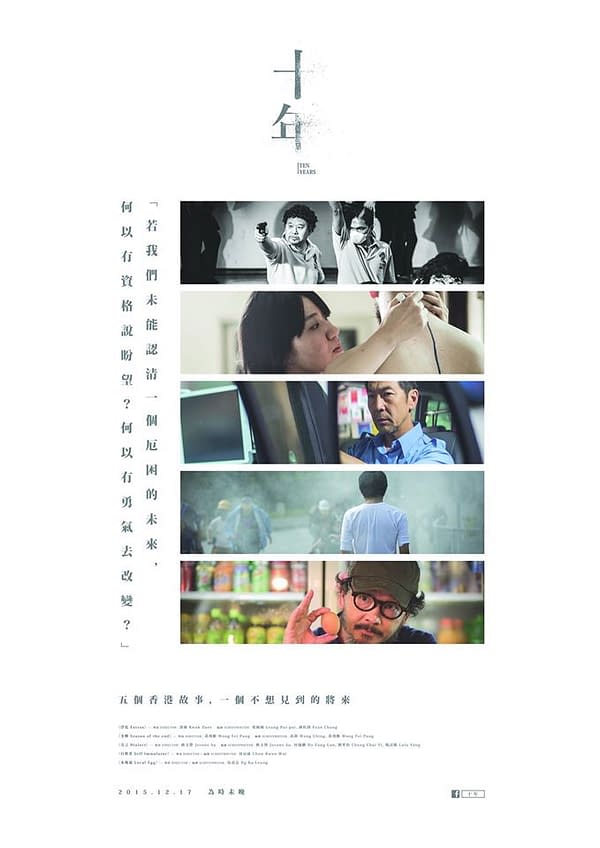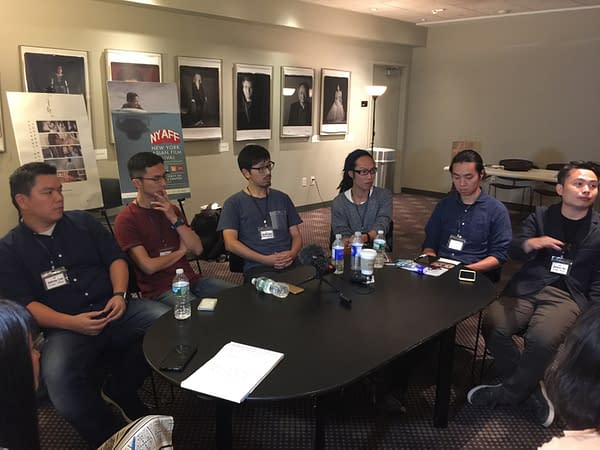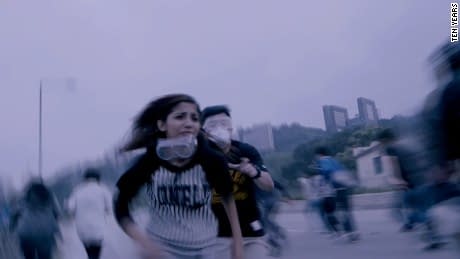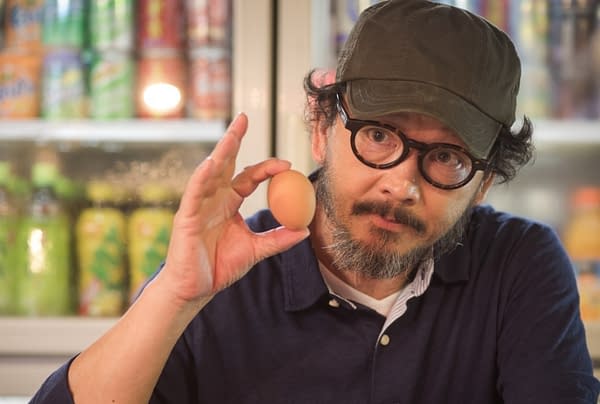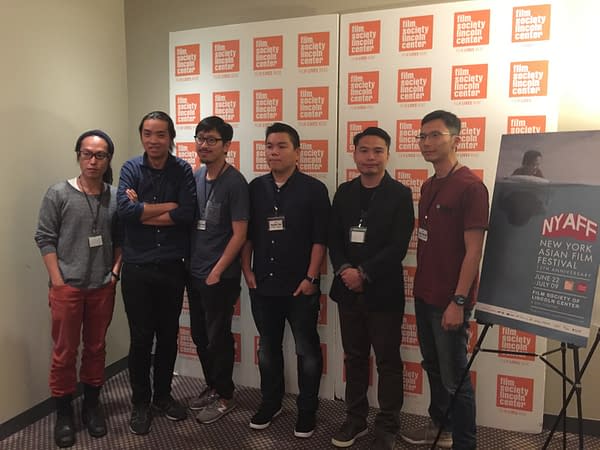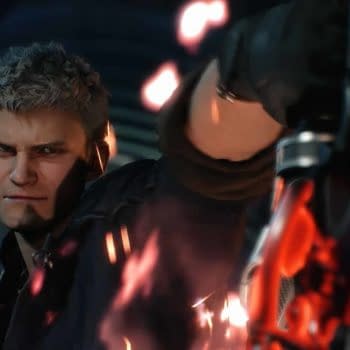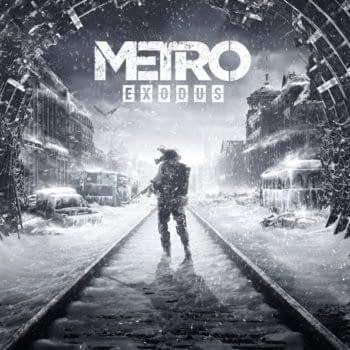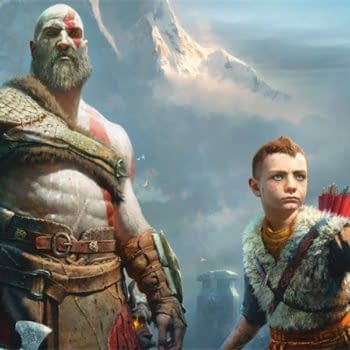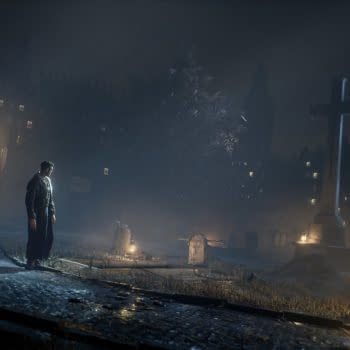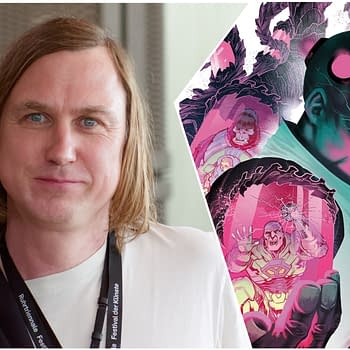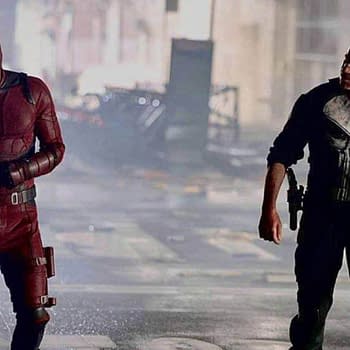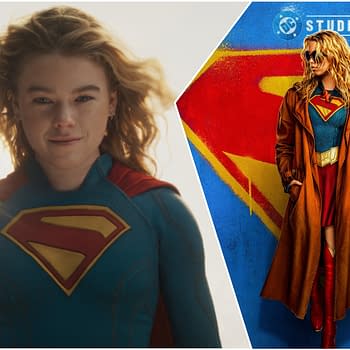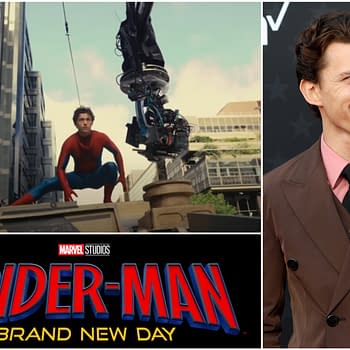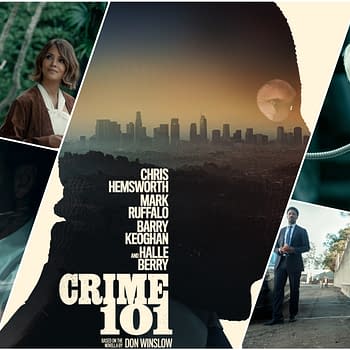Posted in: Movies, NYCC | Tagged: adi tantimedh, entertainment, film, look it moves, new york asian film festival
New York Asian Film Festival: Roundtable with the Makers of 10 Years – Look! It Moves! By Adi Tantimedh
Adi Tantimedh writes,
On Monday, Ten Years got its North American premiere at the New York Asian Film Festival. A soft Science Fiction anthology movie featuring five shorts that explore Hong Kong's fears of what might happen under Mainland Chinese rule, it has been condemned by the Chinese government as a mental "virus", was a hit during its short theatrical run in Hong Kong and continues to be shown at private venues and community centers, even winning Best Film at the Hong Kong Film Awards.
The festival also flew in the producer and five directors to represent the movie. For the most explicitly political movie to come out of Hong Kong after the Chinese takeover, this was a big deal. The movie has become a rallying cry for Hong Kong as it fears losing not just its freedoms but also its unique cultural identity under Chinese rule. The festival held a press conference with the producers and filmmakers to talk about the movie.
Producer Andrew Choi on the genesis of the film: "The idea started two years ago. We did a documentary about small shops in Hong Kong and the government about three years ago. We completed that project and started thinking, what should be our next project? Hong Kong had been facing some changes politically and in the economy under the influence of Mainland China. So we wanted to do a project about the future of Hong Kong. We asked, 'What would happen to Hong Kong in ten years?' We were an independent movie with a low budget. Initially we didn't have the idea of inviting five directors, but Jevon, the first director that we talked to, suggested that with that budget we could not do a feature film. So we ended up with the other directors and we gave them total freedom to pick their topic, write their own script. When we first made the film, we could never imagine such a huge response. We didn't even imagine we could get it widely released, because normally as an independent film, we would have to negotiate with the local cinemas. Fortunately, we premiered at the Hong Kong Asian Film Festival in 2015. We released it in December 2015 and we've had an interesting journey in the past six months."
The film actually began before the Umbrella Movement, which began when they were still in production, so they became informed by it. There had been a general feeling of pessimism in Hong Kong, the feeling that change was impossible, so the film became infused with the prevailing emotions that came out of the Umbrella protests. That said, the filmmakers don't feel things are completely hopeless. Change is possible, but not easy. And the filmmakers hope Ten Years might contribute to that possibility.
Kwok Zune's "Extras opens the movie with a bitterly satirical tale of two low-level triads ordered to stage a shooting at a political rally, unaware they're the patsies for a false flag operation by Mainland officials to use the panic to introduce restrictive security laws. "Before the Umbrella Movement, I had been writing different stories, but after the movement, I threw them away because my state of mind was changing. There were people in the movement who had no political stance, but executed a political mission. That was the inspiration in my film for the two low-level gangsters who try, and the whole atmosphere of the film is satire. Our government is getting more and more ridiculous and they think we are fools. They don't even act. That's how it started."
Wong Fai-Pang on "Season of the End", a vignette about a couple trying to archive relics from a Hong Kong that no longer exists, and the husband volunteers to have himself declared and catalogued as a relic: "The story began with a loss of city renewals in Hong Kong, because development in Hong Kong is quite fast. Every time you go to Hong Kong even in the same year, things will have changed. You wonder if anything can last the history of Hong Kong. I wonder if I can show the places of my childhood to my son. That constant change made me think about even our personalities. When time passes, our personalities can change. If you fix your personality or your knowledge, is it possible to survive all that? In the Umbrella Movement and even previous movements, a number of people would say 'we don't need something' or 'we don't need that thing.' Is that true? If a lot of people say you're wrong, are you really wrong? You need to keep your identity or your guts to do things you believe in. That's why we made "Season of the End".
Jevan Au Man-Kit made "Dialects", where a taxi driver watches the slow death of Hong Kong identity as Cantonese is gradually phased out in favour of Mandarin as the official spoken dialect. "I looked back at what touched me most, and I found that language and the loss of language was the most moving thing. I was originally a screenwriter. I wrote scripts in Cantonese, then I found I had to start writing in Mandarin. Since it wasn't my mother tongue, I had to call my family to ask for corrections and check, and I lost my confidence. They say Hong Kong people are very flexible. Before the Handover we were a British colony and people were learning English to speak it well. Then after that with the Chinese economy opening up with more Chinese customers and business, people started to learn Mandarin. While Cantonese is the mother tongue and important, I felt like a foreigner in my own home. Just a few days ago, I was back at Hong Kong International Airport reclaiming my luggage and the staff asked if I could speak Mandarin. That was really sad. If I have a kid and I'm not good at Mandarin, my kid will probably speak Mandarin very well with his own generation. I thought about how we could communicate with each other and so decided on this story. I just want the audience to ask what kind of future they wanted.
Chow Kuan Wai made "Self-Immolator", the most overtly political of the shorts, covering political protests kicked off by a person unknown setting themselves on fire in front of the British Consulate to protest Hong Kong's increasing oppression by the Mainland. "I chose a mock-documentary style for my segment because of an old Chinese saying: "To directly accuse is wrong." I felt with a documentary format, I could directly talk about what I feel is so screwed up about the current government and the rule in society in general. I didn't need to be subtle, I didn't need to be vague. I could just come out and say, "This is not right." The political system for Hong was established in the 80s as "One country, two systems". China would only deal with national defence and diplomacy. That was decided back then. Hong Kong was supposed to be more independent. In the nine years since the Handover, the city is falling. The city is dying. I feel that Communism is destroying us. They're interfering in other things like education, real estate, business, freedom of speech like what's happening with the booksellers. I wanted to use self-immolation as a way to ask a question: with all these laws clamping down on us, where do we go from here? The film ends on that question mark. Who is the self-immolator? Who is willing among us, not just young people, to go above and beyond to make a point and achieve what we really want?"
Ng Kar Leung is the co-producer of the movie and director of "Local Egg", the final and lightest of the shorts where a grocery shop owner watches censorship end the egg industry in Hong Kong and worries about his son's compulsory Youth Guard activities enacting a new version of China's Cultural Revolution, but discovers his son is more savvy and independent-minded than he thought, a small ray of hope for the future. "Since I had total freedom to create a story, I put two concerns I had together, one is local farming and its future in Hong Kong. I did some research on chicken farmers in Hong Kong and their history, and found they didn't have it easy in the last ten, twenty years because of policies the government developed for Hong Kong in relation to the Mainland. The second element was from my thinking that if our kids, the next generation, need to join some political activities, what would those be in a society that's a banning culture where our kids would need to join. I just tried to predict the future based on some history of totalitarian countries and how they used the younger generation in political situations. I put that into the egg story."
"It was after production ended that we decided this was the order of the films that we liked," said Andrew Choi. "We put the heavy stories in order of second and fourth, "Season of the End" and "Self-Immolator", because their messages were very strong and the tone was more depressing, we sandwiched them with "Dialect" in the middle, which was more lively and people could relate, with some jokes. The first one, "Extras", is a complete story in black and white so people could imagine it as dark humour. We put "Local Egg" at the end for some hope, with the secret bookstore. The order made it easier to understand the whole flow."
"I feel the question is not adults creating a bad future for the kids," added Chow Kwan Wai. "But what future are we creating? It's more than just Hong Kong and China relations. We're getting used to many adverse political conditions nowadays, these things happening one thing after another to the point where people just go, "Yeah, we're getting used to it. I don't care. I'll just do my own thing." I have to remind myself to be awake, to be alert and not get used to it. What we do now, such as getting used to this environment, is going to affect our kids."
Ten Years was shown at the New York Asian Film Festival this week. It will be released on DVD in Hong Kong in the Autumn and be available for order online.
Still watching at lookitmoves@gmail.com
Follow the official LOOK! IT MOVES! twitter feed at http://twitter.com/lookitmoves for thoughts and snark on media and pop culture, stuff for future columns and stuff I may never spend a whole column writing about.
Look! It Moves! © Adisakdi Tantimedh


